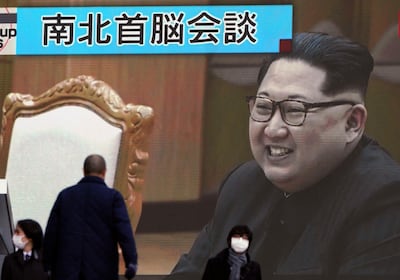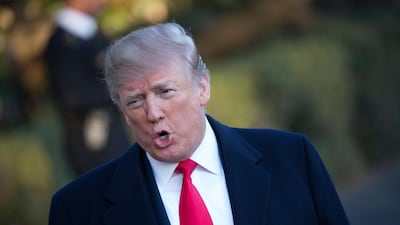President Donald Trump must secure a clear series of commitments and a timetable for implementation from North Korea if his talks with Kim Jong-un are not to repeat previous, failed efforts at denuclearising the region, according to the American diplomat who led the most recent negotiations.
Mr Trump stunned the world and his own aides by announcing late on Thursday that he would meet Mr Kim by May.
Few further details of the first such meeting between leaders of the US and North Korea have been released, and analysts warn that Washington risks being played by Mr Kim, who has long sought the diplomatic coup of meeting the American president.
A hollowing out of senior staff with Korean experience has also raised questions about whether the Trump government has sufficient expertise for a successful strategy, or whether Mr Trump is driving the effort alone.
White House aides insist they have already won concessions, citing assurances from South Korean officials that Pyongyang says it is ready to denuclearise and halt weapons tests.
But Christopher Hill, who served as chief US negotiator with North Korea from 2005 to 2009, said the first step was to get a public commitment from Mr Kim’s regime.
“If they are going forward with another round of this stuff, they need to get the North Koreans on the record as they indicated that they want to denuclearise,” he said, “which is something the South Koreans brought back from Pyongyang.”
_______________
Read more:
Trump faces biggest test in meeting with Kim Jong-un
Trump-Kim summit looks like a breakthrough, but is it?
How Kim Jong-un is following the playbook of his father
_______________
A meeting between Mr Kim and Mr Trump would have been unthinkable just a few weeks ago. The two leaders have exchanged childish insults – calling each other “mentally deranged" and “little rocket man” – while the US president threatened to rain “fire and fury” on North Korea if it continued its provocative nuclear weapon and missile tests.
Mr Trump agreed to a meeting in typically unpredictable fashion. He reportedly heard that South Korean officials were in the White House to brief his own team on Thursday and summoned them to the Oval Office, where he was told that the North Korean leader had issued a personal invitation.
Without consulting his aides, he told Chung Eui-yong, who led South Korea’s recent delegation to Pyongyang, that he would accept.
Since then White House officials have scrambled to keep pace with developments, insisting that their policy of “maximum pressure” had forced Pyongyang’s hand.
On Friday, Sarah Huckabee Sanders, White House press secretary, denied allegations that Mr Trump had given Mr Kim exactly what he wanted – a meeting on equal terms – without getting anything in return, saying officials had been assured North Korea was committed to denuclearisation.
A day later Mr Trump added his thoughts via Twitter.
“North Korea has not conducted a missile test since November 28, 2017 and has promised not to do so through our meetings,” he wrote. “I believe they will honour that commitment!”
The question now is whether Mr Trump’s idiosyncratic approach to dealmaking is enough to bring real results. Analysts say having secured a meeting, the next step is to identify what “denuclearisation” means and how it can be achieved.

Mr Hill, who is now chief adviser to the chancellor in global engagement at the University of Denver, said there were lessons to be drawn from the last attempt to end North Korea’s nuclear programme. He headed the US delegation during the so-called six-party talks which began after North Korea withdrew from the Nuclear Non-Proliferation Treaty.
North Korea agreed to close its nuclear facilities in return for aid and the normalisation of relations. The deal collapsed in 2009 when Pyongyang launched a rocket in defiance of international pressure and suspicions it was testing an inter-continental ballistic missile.
Mr Hill said progress was aided by Chinese leadership, but hampered throughout by a lack of momentum, as North Korea stalled repeatedly.
“Ultimately, it failed because they didn’t give us any verification,” he said. “They were prepared to let us verify that which we already knew.”
This time around, he said, the Trump government needed to put more effort into wooing Beijing, where many security officials believe US troops in South Korea pose more of a threat than North Korean nuclear missiles.
“That’s where a lot of the diplomacy needs to come in,” he said. “We need to be talking to the Chinese day and night about these things.”
Another problem may be the gaps in key foreign policy roles.
Mr Trump has yet to appoint an ambassador to Seoul. And earlier this month the special envoy for North Korean policy, Joseph Yun, retired. He had been responsible for the “New York channel” of communications between Pyongyang and Washington.
The absences have provoked speculation that the State Department was looking for a senior, outside figure to take on the role.
Scott Snyder, director of the US-Korea policy programme at the Council on Foreign Relations, said any appointee would need experience of dealing with Pyongyang, a solid understanding of previous talks, and sufficient standing to represent the US government overseas.
But the most important factor, he said, was to be able to work with an unpredictable president.
“The critical issue is that you have to be someone who Trump trusts,” he said. “That’s the hardest one, because Trump doesn’t seem to trust expertise”
For now, that may leave only one figure qualified.
“The only special envoy I know is Donald Trump right now,” is how Mr Hill put it.

